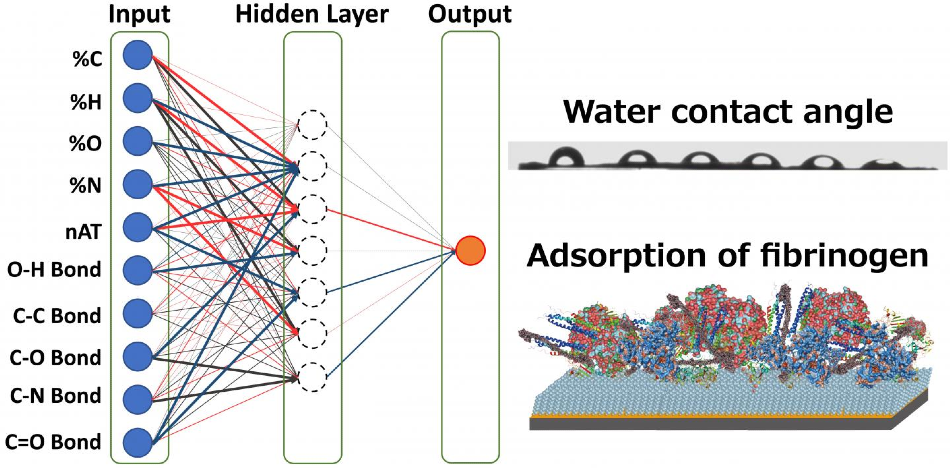Aug 25 2020
At the Tokyo Institute of Technology (Tokyo Tech), scientists have made use of artificial intelligence (AI) to estimate the extent to which ultra-thin organic materials water repel water and adsorb proteins.
 Artificial neural network model used in this work. Image Credit: ACS Biomaterials Science & Engineering.
Artificial neural network model used in this work. Image Credit: ACS Biomaterials Science & Engineering.
The technique used by the team allows accurate estimation of protein adsorption and water repulsion even by hypothetical materials, paving the way for new possibilities for the screening and development of organic materials with preferred functions.
The use of informatics in the area of inorganic material design has resulted in the emergence of semiconductors, batteries, and catalysts of new kinds. On the contrary, scientists have just started exploring informatics-based engineering of biomaterials (i.e. organic and not inorganic solid-state materials).
At present, a research group from Tokyo Tech, headed by Associate Professor Tomohiro Hayashi, has been successful in paving the way toward this emerging field.
The researchers employed machine learning along with an artificial neural network (ANN) model to estimate two important properties—the degree of water repulsion and affinity to protein molecules—of ultra-thin organic materials also called self-assembled monolayers (SAMs).
Scientists have extensively used SAMs to develop model organic surfaces to investigate the interaction between materials and proteins, as they are highly versatile and easy to prepare.
The researchers trained the ANN with a literature-based database, including 145 SAMs, making the ANN able to accurately estimate protein adsorption and water repulsion (measured in terms of the degree of water contact angle). They then demonstrated the prediction of protein adsorption and water repulsion even in the case of hypothetical SAMs.
SAMs are useful in the development of various applications in fields of biomedicine and organic electronics. The two properties analyzed in this research work are of high significance to biomedical engineers.
For example, implant materials that exhibit low water contact angle enable fast integration with the surrounding hard tissues. In the case of artificial blood vessels, the resistance to the adsorption of blood proteins, in particular fibrinogen, is a critical factor to prevent platelet adhesion and blood clotting.
Tomohiro Hayashi, Associate Professor, Tokyo Institute of Technology
In general, the research paves the way toward sophisticated material screening and design of SAMs that have considerably reduced costs and production time scales.
As a next step, the researchers intend to continue to further expand their database and, within the next few years, to scale up their technique to include other materials such as metals, ceramics, and polymers.
Journal Reference:
Kwaria, R. J., et al. (2020) Data-driven prediction of protein adsorption on self-assembled monolayers toward material screening and design. ACS Biomaterials Science & Engineering. doi.org/10.1021/acsbiomaterials.0c01008.